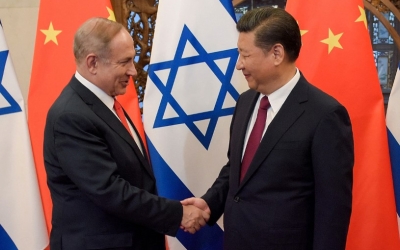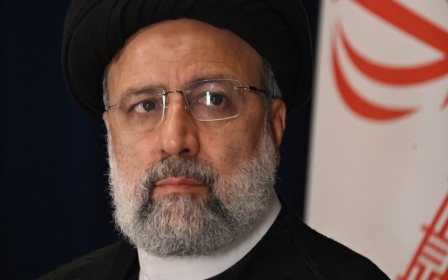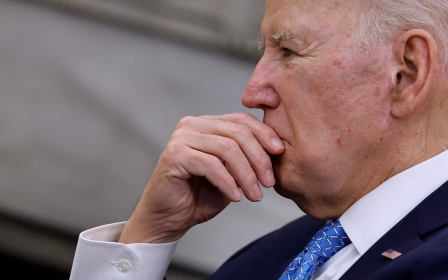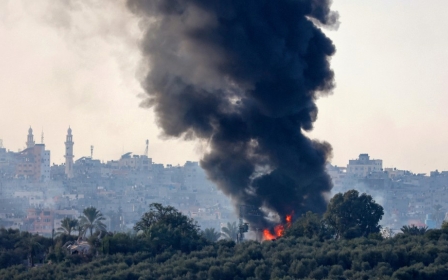War on Gaza: There is no China-Russia-Iran axis
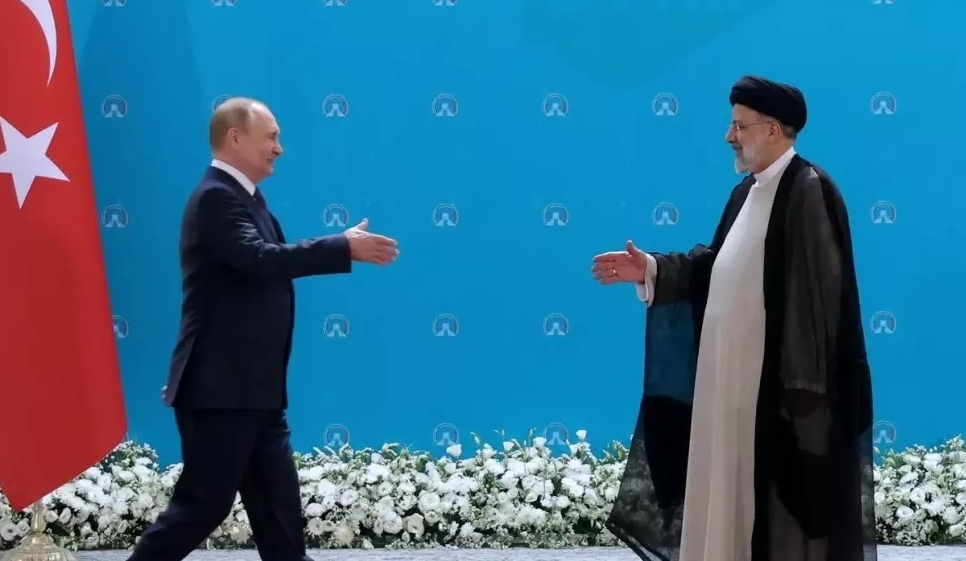
The war on Gaza has put the issue of Palestine front and centre in global affairs. No major power can avoid addressing this question. Laid to rest is the idea that the Palestinian struggle can be buried under the Abraham Accords.
The way in which China and Russia have navigated the fallout from Gaza has been informative of their foreign policies vis-a-vis the Middle East. Ultimately, Israel’s war on Gaza, which the International Court of Justice (ICJ) has ruled to be a plausible case of genocide, has been a gift to Beijing and Moscow, given the ease with which they can highlight the West’s hypocrisy on human rights.
Hussein Ibish, a senior resident scholar at the Arab Gulf States Institute in Washington, said the Palestinian issue is “useful” to China and Russia because it helps build their respective cases against the international and regional orders that they challenge.
It also makes it easier for both powers to accuse the West of double standards “by asserting a supposedly rules-based order which nonetheless allows exceptions for specially favoured client states like Israel, and against particularly disfavoured or inconvenient peoples such as the Palestinians”, Ibish told Middle East Eye.
Although a Chinese envoy met Hamas political leader Ismail Haniyeh in Qatar on 17 March and Russia hosted Hamas, Islamic Jihad, Fatah, and other factions for an intra-Palestinian meeting beginning late last month, neither Beijing nor Moscow have helped the Palestinian cause in concrete ways.
New MEE newsletter: Jerusalem Dispatch
Sign up to get the latest insights and analysis on Israel-Palestine, alongside Turkey Unpacked and other MEE newsletters
They could have done far more to pressure Israel through economic and commercial sanctions, severing (or at least downgrading) diplomatic relations with Tel Aviv, joining other countries at the ICJ, or implementing travel restrictions.
Their own national interests explain such inaction. Put simply, Beijing and Moscow benefit in many ways from their multifaceted relationships with Tel Aviv. Regardless of all the death, destruction and starvation in Gaza, China and Russia are seeking to preserve their ties with Israel.
“Both China and Russia have really important trading relationships with Israel. They don’t want to disrupt that,” Nader Hashemi, director of Georgetown University’s Prince Alwaleed bin Talal Center for Muslim-Christian Understanding, told MEE.
Similar interests
According to Mark Katz, a politics professor at George Mason University, China and Russia have similar interests when it comes to Israel and the Gaza war.
“Beijing wants to align itself with Arab and Muslim public opinion, but also wants to preserve cooperation with Israel which it values,” he told MEE. “This similarity in Russian and Chinese policy, though, need not have been coordinated between them, but may simply be the result of each pursuing its own interests which largely coincide.”
Follow Middle East Eye's live coverage of the Israel-Palestine war
It is no surprise that the Kremlin seeks to preserve “relatively good ties” with Tel Aviv, considering that several influential Russian billionaires have Israeli citizenship, Nikola Mikovic, a Belgrade-based political analyst, told MEE. “Also, the fact that Israel did not join anti-Russian sanctions and did not (at least officially) supply Ukraine with weapons, allows Moscow to ‘sit in two chairs’ and act as a ‘friend’ of both Israel and the Palestinians,” Mikovic added.
Beijing, Moscow and Tehran 'do not share an ideological vision, a preferred global or regional outcome, or even a set of interests that dictate common responses to emergent crises'
In addition, with Moscow bogged down in Ukraine while the frozen Moldova-Transnistria conflict risks unfreezing, and Russia's attention is entirely focused on the Islamic State-Khorasan threat following the the concert hall attack on 22 March, the Russian government cannot afford to become excessively involved in the war on Gaza, especially considering the conflict’s regional and international dimensions.
For the Iran-led “axis of resistance”, the war on Gaza is a wake-up call that China and Russia are not allies of Tehran and aligned groups backed by Iran, such as Lebanon’s Hezbollah.
There has been “a lot of hyperventilation” around the notion of a China-Russia-Iran axis, Yun Sun, co-director of the East Asia Program at the Stimson Center, told MEE.
“Russia, China and Iran share some common interest, such as in countering US influence in the region,” she said. “But they are not always on completely the same page. China doesn’t believe in [a] strategy of chaos, and its oil imports actually depend on stability in the region.”
'Wishful thinking'
According to Katz, Moscow could have made it more difficult for Israel to hit Iranian and Hezbollah targets “through turning over more air defence assets to Syria, Iran or Hezbollah, and/or letting it be known that Russian forces were being embedded with Iranian and Hezbollah fighters” so that Israel would be open to Russian retaliation if it attacked either.
Hashemi also dismissed the idea of an emerging China-Russia-Iran “axis”, saying it comes down to “wishful thinking among some people on the left in the West who are rightfully upset about US policy and western policy around the world, including in Israel-Palestine, and [are] hoping that Russia, China and Iran can form an axis to push back against US imperialism”.
He added: “I don’t think Russia and China really have a ‘dog in this fight’ when it comes to Israel-Palestine.”
Ibish described China, Russia and Iran as “revisionist” powers with anti-status-quo agendas, noting that “the US- and western-dominated post-Cold War international system that emerged after the downfall of the Soviet Union is inappropriate, undesirable, and ultimately intolerable”.
But, he added, Beijing, Moscow and Tehran “do not share an ideological vision, a preferred global or regional outcome, or even a set of interests that dictate common responses to emergent crises”. It is thus a “wild overstatement” to imagine them forming a trilateral alliance or axis.
National interests have ultimately prevented their partnerships from becoming formal alliances. Over the past two decades, Mikovic said, Russia has abandoned Iran “at every juncture” as required by its own interests.
“Historically, Russia has used Iran as a counterweight or source of leverage to balance its relations with the West,” he said. “Although Iran now supplies Russia with weapons, that doesn’t mean the two countries have the same goals when it comes to the war in Gaza.
“Moscow and Beijing are not taking any practical steps to help the Palestinians and stop Israeli actions in Gaza,” he added. “While Russia remains preoccupied with the war in Ukraine, China is unlikely [to be] willing to jeopardise its relations [with] the US - Beijing’s main trade partner - over Israel.”
The views expressed in this article belong to the author and do not necessarily reflect the editorial policy of Middle East Eye.
Middle East Eye delivers independent and unrivalled coverage and analysis of the Middle East, North Africa and beyond. To learn more about republishing this content and the associated fees, please fill out this form. More about MEE can be found here.



